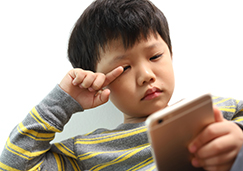NCD Watch
Growing Up Digital: Overview of Screen Media Use among Children
30 Apr 2019 (Tue)
 Like globalisation and urbanisation, ‘digitalisation’ has already changed the world. For many children today, various screen media (such as TV, electronic game consoles, computers, tablets and smartphones) have become part of everyday life. Apart from enjoyment by playing games, watching video clips and socialising online, electronic screen products can also serve as tools for teaching and learning. While children may benefit from appropriate kind of screen time and high-quality programmes, excessive and inappropriate use of Internet and electronic screen products (IESP) can negatively affect many aspects of children’s physical, psychosocial and mental health development.
Like globalisation and urbanisation, ‘digitalisation’ has already changed the world. For many children today, various screen media (such as TV, electronic game consoles, computers, tablets and smartphones) have become part of everyday life. Apart from enjoyment by playing games, watching video clips and socialising online, electronic screen products can also serve as tools for teaching and learning. While children may benefit from appropriate kind of screen time and high-quality programmes, excessive and inappropriate use of Internet and electronic screen products (IESP) can negatively affect many aspects of children’s physical, psychosocial and mental health development.
Periodic surveys conducted by the Department of Health (DH) observed that issues associated with the use of IESP were found getting worse among primary and secondary school students. In 2017 survey, over half (53.1%) and two-third (69.3%) of primary and secondary school students respectively admitted that they had quarrelled with parents on their use on IESP. Due to the use of IESP, about one-third (35.7%) and two-third (67.0%) of primary and secondary school students respectively claimed that they slept less; while one-third (32.6%) and two-fifth (41.4%) of primary and secondary school students respectively reported that they had given up outdoor activities. Around two-fifths (39.0% of primary and 43.3% of secondary school students) admitted that their use of IESP had affected their academic performance.
Children’s brains are not fully matured until their mid-20s, impulse control is particularly difficult for them. Children hooked on screens would have their health compromised and miss out various wholesome pursuits, such as the opportunities of learning through active play, outdoor adventures or socialising via actual human interaction. It is noteworthy that outdoor play is essential for healthy child development. Being active outdoors and spending time in nature can help evoke children’s curiosity, enhance their creative thinking, develop gross motor skills, build confidence and resiliency, as well as improve academic performance and social skills. Thus, it is crucial for children to develop healthy screen habits early and have a balance of activities in their life.
Family is an important influence on how children interact with screen media and use their time. Parents should be a role model; moderately monitor children’s use of Internet and electronic screen products; give children less screen time and more ‘green’ time (i.e. playing outdoor).
The DH convened the Advisory Group on Health Effects of Use of Internet and Electronic Screen Products to make recommendations on the use of IESP. There are four sets of recommendations for parents, teachers, primary school students and secondary school students. For more details about healthy use of Internet and electronic screen products or to watch the health tips videos, please visit the website of DH’s Student Health Service at:
https://www.studenthealth.gov.hk/english/internet/health_effects.html
This link will open in a new window
.
Recently, the World Health Organization (WHO) has also issued new guidelines on physical activity, sedentary behaviour and sleep for children under 5 years of age, which emphasised that children need to sit less and play more to grow up healthy. For more information, please visit WHO’s website at:
https://apps.who.int/iris/handle/10665/311664
This link will open in a new window
.






































